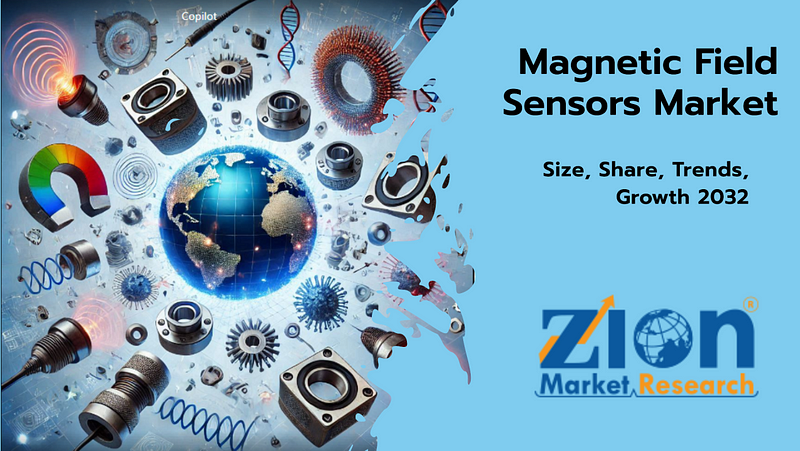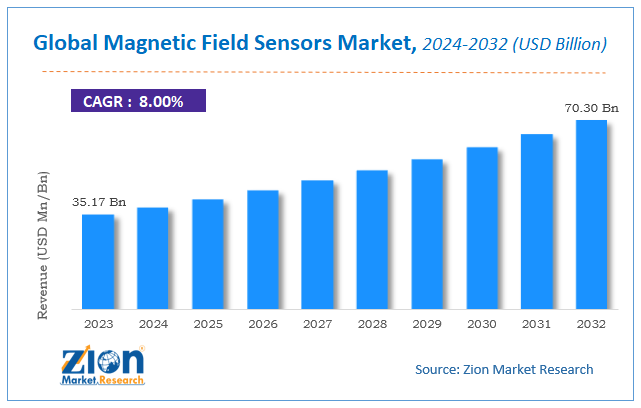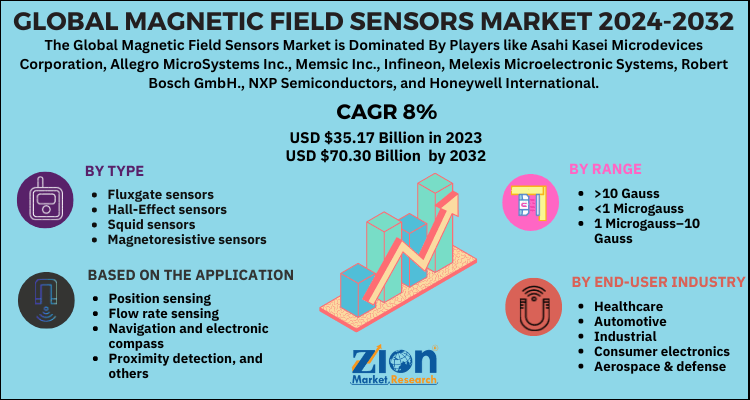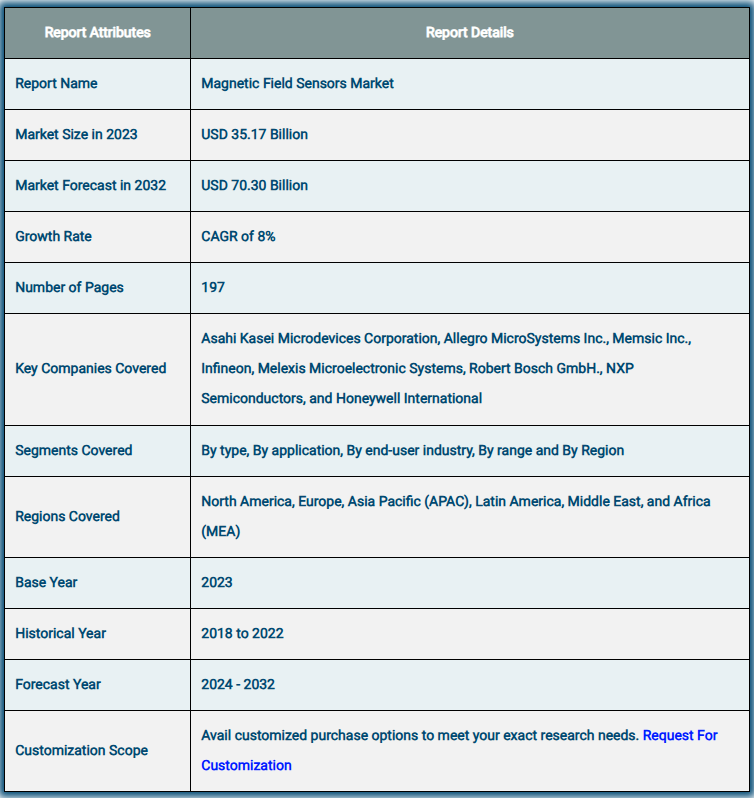Magnetic Field Sensor Industry Trends and Forecast Size, Share, 2032

By the end of 2032, the global magnetic field sensors market is expected to have grown from its 2023 valuation of USD 35.17 billion to USD 70.30 billion. Over the course of the projected period, the market is anticipated to expand at a CAGR of 8%. The study examines the factors driving, impeding, and influencing demand in the global magnetic field sensors market over the course of the projected period. Additionally, it will assist in navigating and investigating the emerging potential in the field of magnetic field sensors.
✈👉Get a Free Sample: 🚀https://www.zionmarketresearch.com/sample/magnetic-field-sensors-market
Introduction
The magnetic field sensors market has seen significant growth over the past few years, driven by advancements in sensor technology and increasing demand for precise measurements in various industrial applications. Magnetic field sensors are essential components in numerous sectors such as automotive, electronics, healthcare, and industrial automation, providing critical data for navigation, positioning, and motion detection.
Overview of the Global Magnetic Field Sensors Market
A device called a magnetic field sensor is used to measure and identify magnetic fields surrounding coils, permanent magnets, and electrical devices. Its revolving sensor tip aids in monitoring the magnetic fields surrounding objects in both the longitudinal and transverse directions. Both strong and weak magnetic fields are measured by magnetic field sensors. The Earth’s magnetic field is weak, but the field surrounding permanent magnets is powerful. Numerous safety systems, including as electronic stability control, steering angle sensing, anti-lock brake systems, and force and torque sensing, heavily rely on magnetic field sensors. Numerous industries, including consumer electronics, homeland security, healthcare, and military & defence, use magnetic field sensors.

Magnetic field sensors detect changes in magnetic fields and convert this information into readable data. These sensors are commonly used in devices like compasses, motors, and smartphones, as well as in specialized applications such as MRI machines and electric vehicle batteries. The market has evolved with the rise of technologies like Internet of Things (IoT) and automation, which require sensors capable of detecting minute magnetic variations with high precision.
The global magnetic field sensor market is poised for continued expansion, driven by factors such as:
- Increasing demand for smart and connected devices
- Advancements in automotive technology, including electric and autonomous vehicles
- The growing importance of magnetic field sensors in healthcare, particularly in diagnostic equipment
- Rising adoption of industrial automation and robotics
Growth Factors for the Global Magnetic Field Sensors Market
The government’s encouragement of the use of environmentally friendly vehicles and the widespread use of smartphones worldwide are two factors that are expected to drive the growth of the magnetic field sensors market. New growth prospects in the market are anticipated as a result of recent developments in automotive infotainment systems and the growing need for safety features in automobiles. The industry is growing because of the ongoing demand for game consoles and computer accessories. The market for magnetic field sensors is benefiting from the growing use of e-compass devices, which improve user navigation. It is projected that technological developments and growing acceptance of magnetic field sensors in emerging economies’ medical applications will support market expansion. However, problems impeding the growth of the magnetic field sensors market include distortion variation, temperature changes, the irregularity of the magnetic field sensor body, low-cost magnetic field sensors, and the lack of aftermarket service.

Market Segmentation Analysis for Global Magnetic Field Sensors
The market for magnetic field sensors is divided into segments according to range, end-user industry, application, and type.The type section is divided into several categories, including magnetoresistive, squid, fluxgate, and Hall-effect sensors. Position sensing, flow rate sensing, electronic compass and navigation, proximity detection, and other applications are the market segments based on their use. Healthcare, automotive, consumer electronics, aerospace & defence, and other industries make up the end-user industry segment. The market is divided into three segments based on range: >10 Gauss, <1 Microgauss, and 1 Microgauss–10 Gauss.
✈👉Directly Purchase a copy of the report with TOC: 🚀https://www.zionmarketresearch.com/toc/magnetic-field-sensors-market
Market for Magnetic Field Sensors: Report Scope

Regional Analysis of the Global Magnetic Field Sensors Market
The magnetic field sensor market is dominated by North America, with Europe and Asia-Pacific following closely behind. The region that generates the most income for magnetic field sensors is Asia Pacific. The market for magnetic field sensors in Asia Pacific is being driven by the rapidly expanding tablet, automobile, and smartphone markets. A strong pace of economic growth is being contributed by China, South Korea, India, and Southeast Asian nations. Two new markets for magnetic field sensing technologies are the United States and Japan. The demand for automobiles in China and India is pushing manufacturers to increase their investments. This is expected to support the expansion of the magnetic field sensors market in the area.
Market Segmentation
- By Sensor Type:Hall Effect Sensors: These sensors detect the magnitude of magnetic fields and are widely used due to their accuracy, reliability, and low cost. They are common in automotive and consumer electronics applications.Magnetoresistive Sensors: These sensors are more sensitive and offer higher precision, making them ideal for advanced industrial and medical applications.Giant Magnetoresistive (GMR) Sensors: These are used in applications requiring ultra-high sensitivity, such as in automotive and aerospace industries.
- By Application:Automotive: Magnetic field sensors are crucial for automotive applications, especially in electric vehicles (EVs), where they are used for battery management, position sensing, and motor control.Consumer Electronics: Magnetic sensors are integral to devices like smartphones, wearables, and gaming controllers, enabling functions like screen orientation and motion sensing. Healthcare: Magnetic sensors are used in diagnostic tools such as Magnetic Resonance Imaging (MRI) machines, as well as in other monitoring systems.Industrial Automation: In industrial settings, these sensors play a role in robotics, automation, and machinery for position sensing and motion detection.
- By Geography:North America: The region holds a significant share of the market, driven by the presence of key players, technological innovations, and high demand for automotive and consumer electronics applications.Europe: Europe is a major player in the automotive and industrial automation sectors, with a strong focus on sustainability and electric vehicles.Asia-Pacific: The Asia-Pacific region is expected to experience the highest growth, fueled by rapid industrialization, technological advancements, and the increasing adoption of IoT-based applications.
Market Drivers
- Technological Advancements: Continuous improvements in sensor sensitivity, size, and cost-efficiency are driving the adoption of magnetic field sensors in various industries.
- Rising Demand for Electric Vehicles: The electric vehicle market relies heavily on magnetic field sensors for various functions like battery management and motor control, spurring growth in the sector.
- Industrial Automation Growth: Automation in industries such as manufacturing and robotics relies on sensors to enhance efficiency and precision, further boosting market demand.
- Healthcare Advancements: The increasing use of MRI machines and other diagnostic tools is driving the demand for magnetic sensors in the healthcare sector.
Challenges
- High Manufacturing Costs: Despite their benefits, some types of magnetic field sensors, especially those based on advanced technologies like GMR, can be expensive to produce, limiting their widespread adoption.
- Competition from Alternative Technologies: Other sensing technologies, such as optical and capacitive sensors, may provide alternatives in certain applications, posing competition to magnetic field sensors.
Key Players in the Market
- Texas Instruments
- Analog Devices
- NXP Semiconductors
- Honeywell International
- Infineon Technologies
- Bosch Sensortec
- STMicroelectronics
These companies are leading innovation in magnetic field sensor technology, focusing on enhancing sensor performance, expanding application areas, and reducing costs.
Market Trends
- Miniaturization of Sensors: The demand for smaller, more compact sensors is increasing, especially in consumer electronics and IoT applications.
- Integration with IoT: Magnetic field sensors are being increasingly integrated into IoT systems for real-time data collection, remote monitoring, and automation.
- Sustainability Focus: In response to growing environmental concerns, there is a shift towards more sustainable manufacturing practices and the use of sensors in green technologies like electric vehicles and renewable energy systems.
Conclusion
The magnetic field sensor market is on a robust growth trajectory, supported by technological advancements and increased demand across various sectors such as automotive, healthcare, and industrial automation. The market’s future appears promising, with ongoing innovation leading to more precise, affordable, and versatile sensors. However, companies must navigate challenges such as manufacturing costs and competition from alternative sensor technologies to maintain a competitive edge.
Forecast and Opportunities
As the demand for smart devices, electric vehicles, and industrial automation continues to rise, the magnetic field sensors market is expected to see significant growth in the coming years. Investments in research and development, alongside strategic partnerships and mergers, will be key drivers of innovation in this dynamic sector.
✈👉Enquiry for buying: 🚀https://www.zionmarketresearch.com/inquiry/magnetic-field-sensors-market
Browse other trend reports:
Ceramic Matrix Composites Market
📞Contact Us:
Zion Market Research212
USA/Canada Toll Free: 1 (855) 465–4651
Network: 1 (302) 444–016611\
📲Web: https://www.zionmarketresearch.com/
👉Blog: https://zmrblog.com/
Comments
Post a Comment